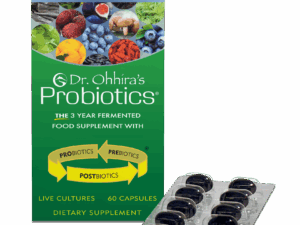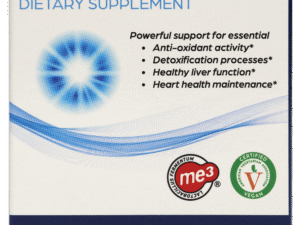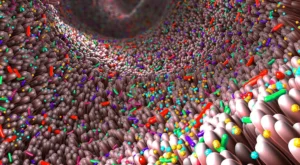Original Post Date: June 25, 2024
Probiotics are Chemical Factories
Scientists are discovering that probiotic bacteria are amazingly complex chemical factories. In 2019, a landmark paper was published titled Postbiotic Metabolites: The New Frontier in Microbiome Science.¹ That paper revealed that the primary “job” of probiotic bacteria is to produce compounds called postbiotic metabolites (synonymous terms appearing in the scientific literature are bacterial metabolites and microbial metabolites). Postbiotic metabolites have a wide range of health-regulating functions in the gut, and throughout the rest of the body. Unfortunately, for a variety of reasons, the microbiome in most people does not produce adequate amounts of postbiotic metabolites. It is becoming increasingly clear that the depletion of postbiotic metabolites, which are essential for health, is associated with a rapid rise in chronic age-related degenerative diseases.²
Probiotic Bacteria Produce Essential Nutrients
Essential nutrients are nutrients our body cannot make, and they are nutrients that we must have on a consistent basis for good health. Until recently, it was thought that we obtained all our nutrition from the food we consume. However, recent research has discovered that various strains of probiotic bacteria are capable of synthesizing some of the essential nutrients that humans require.
Probiotics Produce Essential Vitamins
Various strains of Lactobacilli, Bifidobacteria as well as other species of probiotic bacteria can synthesize all eight of our B-vitamins (B1, B2, B3, B5, B6, B12, folic acid, and biotin) and vitamin K.³,⁴ B-vitamins play vital roles in energy production, cellular metabolism, and the maintenance of healthy skin, brain, and blood cells. B-vitamins also function as coenzymes, which means they help enzymes perform their functions, and they are required for many metabolic processes.
B-vitamin deficiencies occur more commonly among the following groups of individuals: teenagers, adolescent athletes, obese individuals (with high body mass index), and the elderly.
Another fascinating fact is that some species of probiotic bacteria require various B-vitamins, which they cannot synthesize. Thus, they rely on other probiotic bacteria to produce the B-vitamin(s) they need for their viability.⁵
Vitamin K is another essential nutrient that can be synthesized by some species of probiotic bacteria. Vitamin K’s primary functions are in blood clotting and bone health. It’s essential for creating proteins required for blood to clot, which prevents excessive bleeding. It also plays a role in bone metabolism by activating proteins that bind to calcium, which helps to strengthen bones and potentially reduce fracture risk.
The recent understanding that various strains of probiotic bacteria synthesize B-vitamins and vitamin K provides new insight into how humans get some of their nutritional needs met and emphasizes the importance of creating and maintaining a healthy gut microbiome.
Probiotics Produce Essential Amino Acids
Many species of probiotic bacteria can make all twenty of the amino acids,⁶ especially the essential amino acids tryptophan, tyrosine, and phenylalanine. In general, amino acids are required for protein and neurotransmitter synthesis, nerve signaling, and energy production.⁷ Branched Chain amino acids (BCAAs) are non-essential amino acids that have important functions in the body. BCAAs can be both synthesized and degraded by various species of probiotic bacteria. They function as signaling molecules for the regulation of glucose, lipid and protein synthesis.⁸
The recent understanding that various strains of probiotic bacteria synthesize important vitamins and amino acids provides new insight into how humans get some their most important nutritional needs met.
The Dr. Ohhira’s Advantage
The vitamins and amino acids discussed in this article are postbiotic metabolites because they are produced by probiotic bacteria. Unfortunately, many people do not produce adequate amounts of postbiotic metabolites due to poor diets, antibiotics and exposure to environmental toxins. Dr. Ohhira’s Probiotics can be a powerful tool because each dose contains over 500 postbiotic metabolites. The postbiotics in Dr. Ohhira’s Probiotics help reestablish a healthy gut microbiome ecosystem, which will then enable your own probiotic bacteria to thrive and begin producing postbiotic metabolites. That’s The Dr. Ohhira’s Advantage.
-
 Dr. Ohhira’s Probiotics®$13.95 – $89.95Price range: $13.95 through $89.95
Dr. Ohhira’s Probiotics®$13.95 – $89.95Price range: $13.95 through $89.95 -
 Dr. Ohhira’s® Probiotics Professional Formula$39.95 – $129.65Price range: $39.95 through $129.65
Dr. Ohhira’s® Probiotics Professional Formula$39.95 – $129.65Price range: $39.95 through $129.65 -
 Reg´Activ® Essential ME-3$39.95
Reg´Activ® Essential ME-3$39.95
References:
1 Pelton R. Postbiotic Metabolites: The New Frontier in Microbiome Science. Townsend Letter. June 1, 2019;431:64-69.
2 Nagler C. Modern World Influences on the Microbiome and Their Consequences for Immune-Mediated Disease. J Immunol. 2021 Oct 1;207(7):1695-1696.
3 Rowland I, et al. Gut microbiota functions: metabolism of nutrients and other food components. Eur J Nutr. 2018 Feb;57(1):1-24.
4 Hossain KS, et al. B Vitamins and Their Roles in Gut Health. Microorganisms. 2022 Jun 7;10(6):1168.
5 Sharma V, et al. B-Vitamin Sharing Promotes Stability of Gut Microbial Communities. Front Microbiol. 2019 Jul 2;10:1485.
6 Price M, et al. Filling Gaps in Bacterial Amino Acid Biosynthesis Pathways with High-throughput Genetics. PLoS Genetics. 2018 Jan 11;14(1).
7 Dicks LMT. Gut Bacteria and Neurotransmitters. Microorganisms. 2022 Sep 14;10(9):1838.
8 Nie C, et al. Branched Chain Amino Acids: Beyond Nutrition Metabolism. Int J Mol Sci. 2018 Mar 23;19(4):954.





